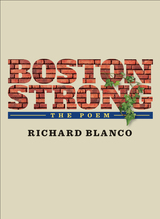
The net proceeds from the sale of this book benefit The One Fund Boston.
The One Fund Boston was established through the generosity of businesses, foundations, and individual donors. The Victim Relief Fund of The One Fund Boston will be used to assist those families of the victims who were killed and the victims who were most seriously affected as a result of the tragic events during the Boston Marathon on April 15, 2013, and related events on April 18 and April 19.
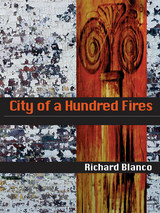
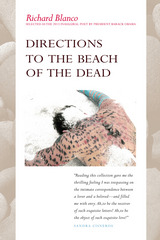
The words are redolent with his Cuban heritage: Marina making mole sauce; Tía Ida bitter over the revolution, missing the sisters who fled to Miami; his father, especially, “his hair once as black as the black of his oxfords…” Yet this is a volume for all who have longed for enveloping arms and words, and for that sanctuary called home. “So much of my life spent like this-suspended, moving toward unknown places and names or returning to those I know, corresponding with the paradox of crossing, being nowhere yet here.” Blanco embraces juxtaposition. There is the Cuban Blanco, the American Richard, the engineer by day, the poet by heart, the rhythms of Spanish, the percussion of English, the first-world professional, the immigrant, the gay man, the straight world. There is the ennui behind the question: why cannot I not just live where I live? Too, there is the precious, fleeting relief when he can write "…I am, for a moment, not afraid of being no more than what I hear and see, no more than this:..." It is what we all hope for, too.
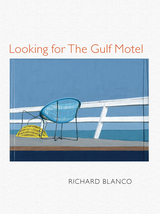
Family continues to be a wellspring of inspiration and learning for Blanco. His third book of poetry, Looking for The Gulf Motel, is a genealogy of the heart, exploring how his family’s emotion legacy has shaped—and continues shaping—his perspectives. The collection is presented in three movements, each one chronicling his understanding of a particular facet of life from childhood into adulthood. As a child born into the milieu of his Cuban exiled familia, the first movement delves into early questions of cultural identity and their evolution into his unrelenting sense of displacement and quest for the elusive meaning of home. The second, begins with poems peering back into family again, examining the blurred lines of gender, the frailty of his father-son relationship, and the intersection of his cultural and sexual identities as a Cuban-American gay man living in rural Maine. In the last movement, poems focused on his mother’s life shaped by exile, his father’s death, and the passing of a generation of relatives, all provide lessons about his own impermanence in the world and the permanence of loss. Looking for the Gulf Motel is looking for the beauty of that which we cannot hold onto, be it country, family, or love.
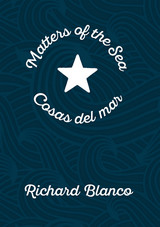
“Matters of the Sea is one of the most emotionally complex and personal poems I’ve ever written, invested with all my love for the people of two countries that are part of my very being. As with the presidential inauguration in 2013, I am once again humbled and honored to participate as a poet in another historic moment of such significance. I’m elated by the power of poetry to mark such important, communal moments and to be a catalyst for change and understanding by reaching deep into our emotional selves and connecting us to our shared humanity.”—Richard Blanco
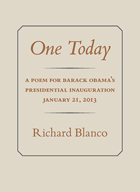
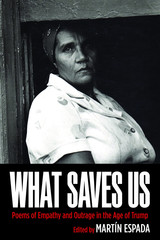
This is an anthology of poems in the Age of Trump—and much more than Trump. These are poems that either embody or express a sense of empathy or outrage, both prior to and following his election, since it is empathy the president lacks and outrage he provokes.
There is an extraordinary diversity of voices here. The ninety-three poets featured include Elizabeth Alexander, Julia Alvarez, Richard Blanco, Carolyn Forché, Aracelis Girmay, Donald Hall, Juan Felipe Herrera, Yusef Komunyakaa, Naomi Shihab Nye, Marge Piercy, Robert Pinsky, Danez Smith, Patricia Smith, Brian Turner, Ocean Vuong, Bruce Weigl, and Eleanor Wilner. They speak of persecuted and scapegoated immigrants. They bear witness to violence: police brutality against African Americans, mass shootings in a school or synagogue, the rage inflicted on women everywhere. They testify to poverty: the waitress surviving on leftovers at the restaurant, the battles of a teacher in a shelter for homeless mothers, the emergency-room doctor listening to the heartbeats of his patients. There are voices of labor, in the factory and the fields. There are prophetic voices, imploring us to imagine the world we will leave behind in ruins lest we speak and act.
However, this is not merely a collection of grievances. The poets build bridges. One poet steps up to translate in Arabic at the airport; another walks through the city and sees her immigrant past in the immigrant present; another declaims a musical manifesto after the hurricane that devastated his island; another evokes a demonstration in the street, shouting in an ecstasy of defiance. The poets take back the language, resisting the demagogic corruption of words themselves. They assert our common humanity in the face of dehumanization.
READERS
Browse our collection.
PUBLISHERS
See BiblioVault's publisher services.
STUDENT SERVICES
Files for college accessibility offices.
UChicago Accessibility Resources
home | accessibility | search | about | contact us
BiblioVault ® 2001 - 2024
The University of Chicago Press









